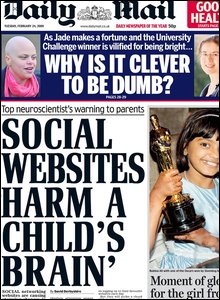Just how bad is Facebook for you?
www.VUE DES ISLES.com :: UK & World News,Business & Sports Latest :: Current World & UK Affairs :: Old Bits & Bobs
Page 1 of 1
 Just how bad is Facebook for you?
Just how bad is Facebook for you?
 The examination period is always stressful, both for those sitting GCSEs, A levels and the International Baccalaureate and for their parents and siblings who get 'second-hand stress' without even a certificate to show for their efforts. The examination period is always stressful, both for those sitting GCSEs, A levels and the International Baccalaureate and for their parents and siblings who get 'second-hand stress' without even a certificate to show for their efforts. My friends and I used to revise together, hoping that it would create enough social pressure to keep us working through the evening, but being in the same room is clearly no longer required. My daughter, in the midst of IB exams, and my son, facing GCSEs next week, have email, instant messaging and of course Facebook and other social network sites to keep in touch with their school mates and share revision tips and exam guidance. Some revising schoolchildren probably found their access to Facebook severely curtailed last month, however, after The Sun revealed that those who checked the site every day dropped a grade in their studies while heavy users were doing as little as an hour of school work a week. The story was far from exclusive to The Sun, as a quick search of Google News reveals. It made dozens of papers and websites, including The Times, The Calgary Herald, and The Australian, which told its readers that "Facebook fixation harms student grades" and referred worried readers to a Sydney University-based group called "I want to sue Facebook if I fail university". Social networking scare stories are becoming increasingly popular, perhaps because the internet remains strange and mysterious despite its popularity while the long term impact of the network on our society is only just becoming apparent. Cancer risk
So we see absurd stories like the Daily Mail's recent claim that "using Facebook could raise your risk of cancer", stories that entertain and frighten readers in equal measure by combining carefully selected psychological research with unfounded speculation to create a tale that has no basis in fact but aligns perfectly with widespread fears about new technologies. This could also explain the love-hate relationship with Twitter in the press, where the service is a dull and tedious celebrity circus one day, and a cool way to stay in touch the next. Facebook's impact on academic grades seemed to be different, however, as it was backed up by some real science. The findings were based on a survey of 219 students at Ohio State University carried out by doctoral student Aryn Karpinski and Adam Duberstein of Ohio Dominican University and presented to a prestigious meeting of the American Education Research Association, which is as scientific as the media gets. But of course things are never as straightforward as they seem, and the research which looked so conclusive in the pages of The Sun is actually far from definitive. Karpinski's presentation, "A Description of Facebook Use and Academic Performance Among Undergraduate and Graduate Students," was not an invited peer-reviewed paper but a less formal poster session at the conference. The data showing a correlation between Facebook use and academic performance had not been published, and most of the news coverage seems to have been based on reading the abstract of the session without looking at the detail. "Very basic" The press coverage prompted further investigation, and in an article for the online journal First Monday Josh Pasek, Eian More and Eszter Hargittai describe how they analysed data from other studies to see if Facebook did have the claimed effect on grades. They found no support for Karpinski's findings, noting instead that "if anything, Facebook use is more common among individuals with higher grades." Karpinski then defended her work, noting that "my exploratory study and subsequent poster presentation were very basic. I merely planned to do this... to get some ideas and network with more experienced researchers in this area." She also took the time to consider the methods used in the othersurveys, offering a detailed and technical critique that demonstratesjust how complex this area is. This is real science, and it has to be done if we are to establish a sound basis for our understanding of thesenew technologies. Talking about coding methods and regression analyses may not be exciting for headline writers, but it is at the heart of this current debate. None of the newspapers and websites that were so keen to exaggerate the original claims seem interested in following the real scientific debate, with the honourable exception of Carl Bialik in the Wall Street Journal who was careful to discuss the limitations of the original research and said right from the start that the area needed more study. The press move on to another scare story, the impression that Facebook is bad for your studies remains, and the detailed research that will help us understand the emerging network society remains unread and unremarked upon. Perhaps we will have to wait for the semantic web and intelligent search, so that anyone calling up a dodgy article about the dangers of social networking is forced to review the latest academic research before they proceed.  Bill Thompson is an independent journalist and regular commentator on the BBC World Service programme Digital Planet Source: http://news.bbc.co.uk/2/hi/technology/8033466.stm . | |||

Dell-

Number of posts : 4468
Location : Guernsey
Humor : Yes please!
Registration date : 2008-12-31
 Similar topics
Similar topics» Check Facebook from Bed? You're Not Alone
» Facebook
» Facebook Group
» VDI Facebook Fans
» Facebook font too small?
» Facebook Group
» VDI Facebook Fans
» Facebook font too small?
www.VUE DES ISLES.com :: UK & World News,Business & Sports Latest :: Current World & UK Affairs :: Old Bits & Bobs
Page 1 of 1
Permissions in this forum:
You cannot reply to topics in this forum|
|
|


 There are plenty of scare stories in the media
There are plenty of scare stories in the media

 The research which looked so conclusive in the pages of The Sun is actually far from definitive.
The research which looked so conclusive in the pages of The Sun is actually far from definitive.  Bill Thompson
Bill Thompson